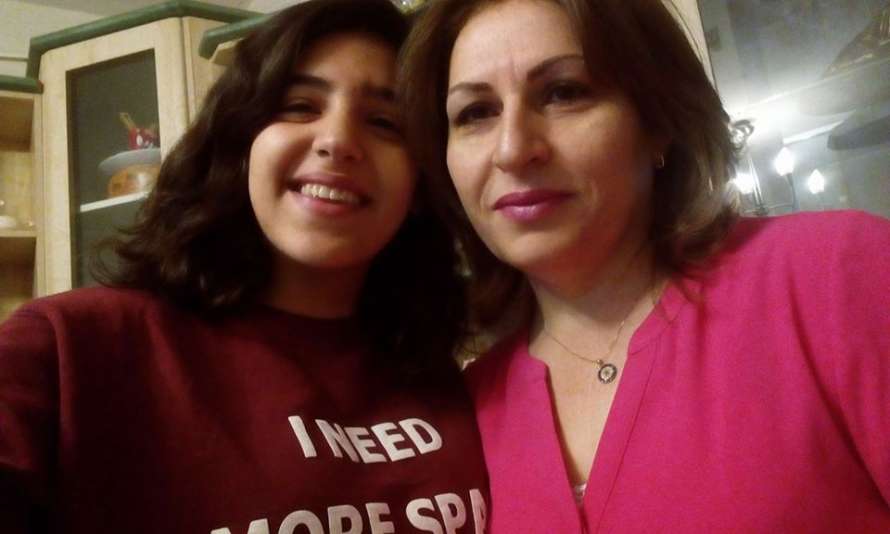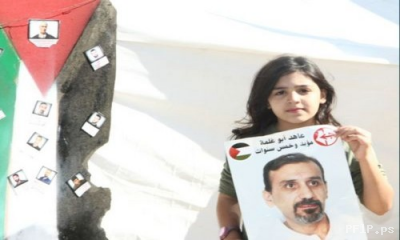
The wife and daughter of imprisoned Palestinian leader Ahed Abu Ghoulmeh, 50, were permitted to visit him for the first time in many years at Hadarim prison on 20 March, reported Hadf News. Wafa’ Abu Ghoulmeh, Ahed’s wife and a Palestinian organizer, and Rita Abu Ghoulmeh, their teen daughter, have been denied visits with Ahed repeatedly over the years. This was the first visit that Wafa’ and Rita were able to conduct together since 2009.
Ahed Abu Ghoulmeh, a leader of the Popular Front for the Liberation of Palestine, is serving a life sentence in Israeli prison; he was abducted with Ahmad Sa’adat and their comrades Hamdi Qur’an, Basil al-Asmar and Majdi Rimawi on 13 March 2006. They had been held in a Palestinian Authority prison in Jericho for the past four years under U.S. and British guard; in 2006, following promises of Palestinian Legislative Council members to release the PA political prisoners, the Israeli occupation violently attacked and destroyed the prison.
Abu Ghoulmeh and his comrades were seized first by the PA and then the occupation forces after the PFLP’s military wing assassinated notorious far-right, racist Israeli Tourism Minister Rehavam Ze’evi in 2001, in response to the assassination of PFLP General Secretary Abu Ali Mustafa by occupation forces using U.S.-made and -provided weaponry.
During his imprisonment, Abu Ghoulmeh has been repeatedly held in solitary confinement and denied family visits; he has been a leader in the prisoners’ movement and participated in prisoners’ leadership councils, hunger strikes and protests.

In speaking about the visit, Wafa’ Abu Ghoulmeh expressed the difficulties experienced at the hands of the Israeli occupation for Palestinian families who seek to visit their imprisoned family members, beginning their journey at 5 a.m. to pass all of the Israeli checkpoints. After arriving at the prison, she said, all of the families are searched extensively, accompanied by continuous shouting and screaming from occupation soldiers. She noted that the occupation deliberately delays and detains people during these searches. “On the day of our visit, a number of the prisoners’ family members were held back, including the father of Ahed Tamimi, and her brother was prevented from visiting,” said Abu Ghoulmeh.
Family members are forbidden to bring food, drink or personal items with them. Wafa’ said that she could only speak to her husband over a telephone, behind a glass wall. “One policeman stands behind the prisoner and another behind the visitor. Every word we say is heard by this guard….On the way back, we are subject again to the same procedures and harassment. The visit is a joy for prisoners’ families, but it is not without painful moments, especially when watching prisoners with their children.”
She noted that Hadarim prison, where Ahed Abu Ghoulmeh is held, is a type of mass isolation with 100 Palestinian prisoners; all of the men held there are serving life sentences. It is part of the same complex as HaSharon prison, where the women prisoners are held. She noted that family members are forbidden from bringing educational and political books to prisoners in Hadarim, and only religious books and novels are permitted to enter.
Despite the restrictions and repression imposed by the Israeli occupation, Abu Ghoulmeh is preparing to write a doctoral thesis on the Palestinian prisoners’ movement and the psychological situation of people with high sentences. He has compiled research and written significant portions; however, when he was in Ramon prison, the Israeli prison administration confiscated his writings as well as the archive of educational materials maintained by the prisoners. She noted that Abu Ghoulmeh was looking toward Arab and international universities to complete his education; while a number of European universities reportedly expressed interest in facilitating Abu Ghoulmeh’s continued education, he is unable to attend classes and the supervisor of his work is also imprisoned, Marwan Barghouthi.
She said that a Moroccan university has expressed initial approval of the project but seeks to partner with a Palestinian university. In addition, she said that Abu Ghoulmeh is committed to spending every moment in the prison in research, study or teaching other Palestinian prisoners.
Discover more from Samidoun: Palestinian Prisoner Solidarity Network
Subscribe to get the latest posts sent to your email.




